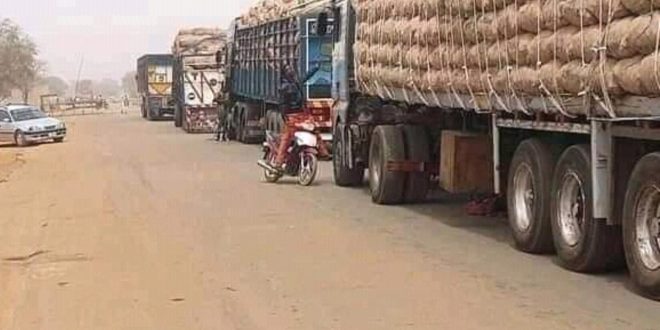The closure of the border between Nigeria’s northern corridor and Niger Republic has put $1.3 billion worth of trade at risk along the trans-Saharan road, a road network connecting six African countries (Algeria, Chad, Mali, Niger, Nigeria, and Tunisia).
The trans-Saharan road corridor borders seven northern Nigerian states —Sokoto, Kebbi, Katsina, Zamfara, Jigawa, Yobe, and Borno. This is a vital trade route for Nigeria, connecting the country to its landlocked neighbours in the Sahel region.
The economic activities along the trans-Saharan road are under threat after President Bola Tinubu shut the borders with the Niger Republic after a request from the Economic Community of West African States (ECOWAS) to attack putschists led by Abdourahamane Tchiani if they return deposed President Mohamed Bazoum to power.
“A lot of Nigerian drivers are stranded on Nigeria’s border with Niger Republic; Most of them went to deliver goods before the closure. There are many uncertainties about the state of the goods which are currently queueing at border gates,” Usman Shamsedeen, a bus driver who plies the trans-Saharan road, told BusinessDay.
Trucks from Nigeria account for 40 per cent of the total daily traffic of 104,179 trucks per day along the trans-Saharan road corridor, data compiled by United Nations Conference on Trade and Development showed.
“We travelled from Jos to Niamey to deliver a shipment of Irish potatoes. We had all the necessary documentation when we left Nigeria, but now we are stranded here with no idea when we will be able to return home,” Shamsedeen added.
Further findings showed the people of Illela, a border local government between Sokoto State and Niger Republic, are feeling the heat of sanctions imposed on the Niger Republic by ECOWAS.
Abdullahi Yusuf, a resident of Illela, said his community had feared the border closure would bring back the economic hardship they had experienced during the last closure, and their worst fears were realised.
“The closure of the border has had a devastating impact on businesses in this town. The border was a major source of trade and commerce, and its closure has led to a sharp decline in economic activity. Many businesses are struggling to survive, and some have even been forced to close their doors,” Yusuf said.
Yinka Adenuga, an analyst with a significant geopolitical research firm, said after the ECOWAS announced its sanction against Niger Republic, hundreds of trucks supplying food products were stuck at the Niger Republic border as Maritime companies refused to load all cargo destined for Niger Republic.
“Some of the truck drivers are not allowed to return to their Nigerian companies by customs officials since they could not proceed to their destination in the Niger Republic,” Adenuga said.
Efforts to reach Abdullahi Maiwada, the national public relations officer of the Nigeria Customs Service, proved abortive when filling this report.
According to the International Trade Centre, Nigeria’s trade through Niger in 2020 was $1.3 billion.
On Monday, ECOWAS spokesperson Amos Lungu said the bloc would hold the extraordinary summit on Niger in Abuja on Thursday, the Nigerian capital’s headquarters.
The 15-nation bloc had taken a hard stance on the Niger coup, the region’s seventh in three years, but has recently sent Abdulsalami Abubakar, Omar Touray, ECOWAS Commission President, and Muhammad Abubakar III, the Sultan of Sokoto as envoys to Niger.
ECOWAS defence chiefs agreed last Friday on a possible military action plan if the detained president, Mohamed Bazoum, was not released and reinstated. However, they said operational decisions would be decided by their heads of state.
However, the bloc is not united. The military governments in Mali and Burkina Faso, both ECOWAS members, have promised to defend their counterparts in Niger if needed.
Both countries were sending delegations to Niamey to show their solidarity, the Malian army said on social media on Monday, and the flight-tracking website FlightRadar24 showed a Burkina Faso military plane arriving in Niger’s capital at about 12:20 pm (11:20 GMT).
Italian Foreign Minister Antonio Tajani said in an interview published on Monday that ECOWAS should extend its deadline for the reinstatement of Bazoum.
“The only way is the diplomatic one,” Tajani told Italian La Stampa newspaper.
“It is right that he (Bazoum) should be freed, but we cannot do it. The United States are very cautious about this. It is unthinkable that they would start a military intervention in Niger,” Tajani added.
At pro-coup rallies in Niamey, some participants have cast the situation as a patriotic battle by the former French colony to retain its independence in the face of imperialist interference. Some have held up Russian flags and expressed anti-French sentiments.
“The demonstration aims to show the whole world and the international community that we are 100 per cent behind [the military],” demonstrator Amadou Hamadou Moumouni said during a rally at the national stadium on Sunday.
(Business Day)
 National Telescope national telescope newspaper
National Telescope national telescope newspaper



